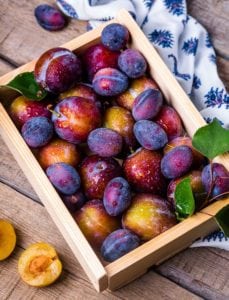 Plums are rich in healthy compounds – antioxidants, anthocyanins and soluble fibers. Of the fruits are jam, jelly and juices.
Plums are rich in healthy compounds – antioxidants, anthocyanins and soluble fibers. Of the fruits are jam, jelly and juices.
The nearest relatives of the sink are nectarines, peaches and almonds.
Dried Plum is called prune. It contains a lot of sugar. For centuries, traditional medicine has used prunes to treat fever, high blood pressure, jaundice, diabetes and constipation.
Composition and calorie content of plum
Potassium, iron, retinol, vitamin K and boron are part of the plum.
Other useful substances in the plums:
- Potassium. Reduces the risk of stroke and high blood pressure.
- Vitamin K. Prevents inflammation and osteoporosis, improves insulin sensitivity.
- Alimentary fiber. About 80% is soluble fiber. The process of drying the plum increases its amount.
- Polyphenols. These are antioxidants that reduce the formation of cancer cells. They are responsible for the acid and can affect the aroma and color of the fruit. Kill the cancer cells.
Benefit of draining
Drinking plums prevents age-related changes in bones and improves bowel health, strengthens the heart and blood vessels, and also prevents cancer.
For bones and joints
Plum slows the development of osteoporosis.
For the heart and blood vessels
Plums reduce blood pressure and prevent heart disease.
For eyes
Carotenoids and vitamin A in plums improve vision.
For the digestive tract
Drinking plums increases the number of beneficial bacteria in the intestine. Even a single use of plums will save you from constipation. If that did not help, drink a glass of plum juice in the morning to make the intestines work.
Plum protects the liver from damage.
Plums are useful for diabetics, as they do not cause sharp jumps in blood sugar.
For immunity
Plums reduce the risk of colon cancer, thanks to fiber. Two studies have shown that the use of fiber interferes with the development of colon adenoma and cancer.
Breast cancer recedes after treatment with plum extract, according to laboratory tests at the Texas AgriLife Research agency. Plum kills cancer cells and protects normal cells.
Harm and contraindications to plums
There are precautions that people should consider when adding plums to the diet:
- Obesity. Excessive consumption of plums can cause weight gain.
- Incorrect work of the gastrointestinal tract. In people who do not suffer from constipation, plums can cause diarrhea.
- Allergy to plums and individual intolerance.
The digestive system of a young child is poorly developed and differs from adults. According to the article on pediatric gastroenterology, hepatology and nutrition, plum juice helps with constipation in children. But there is a feature – an overabundance of juice can cause diarrhea.
How to store plums
Plum is a delicate fruit. Ripe plums should be stored in the refrigerator. They can be frozen and dried. Dried plums can be stored in a cool dry place for up to 2 years.
Image Credit: Daria-Yakovleva
